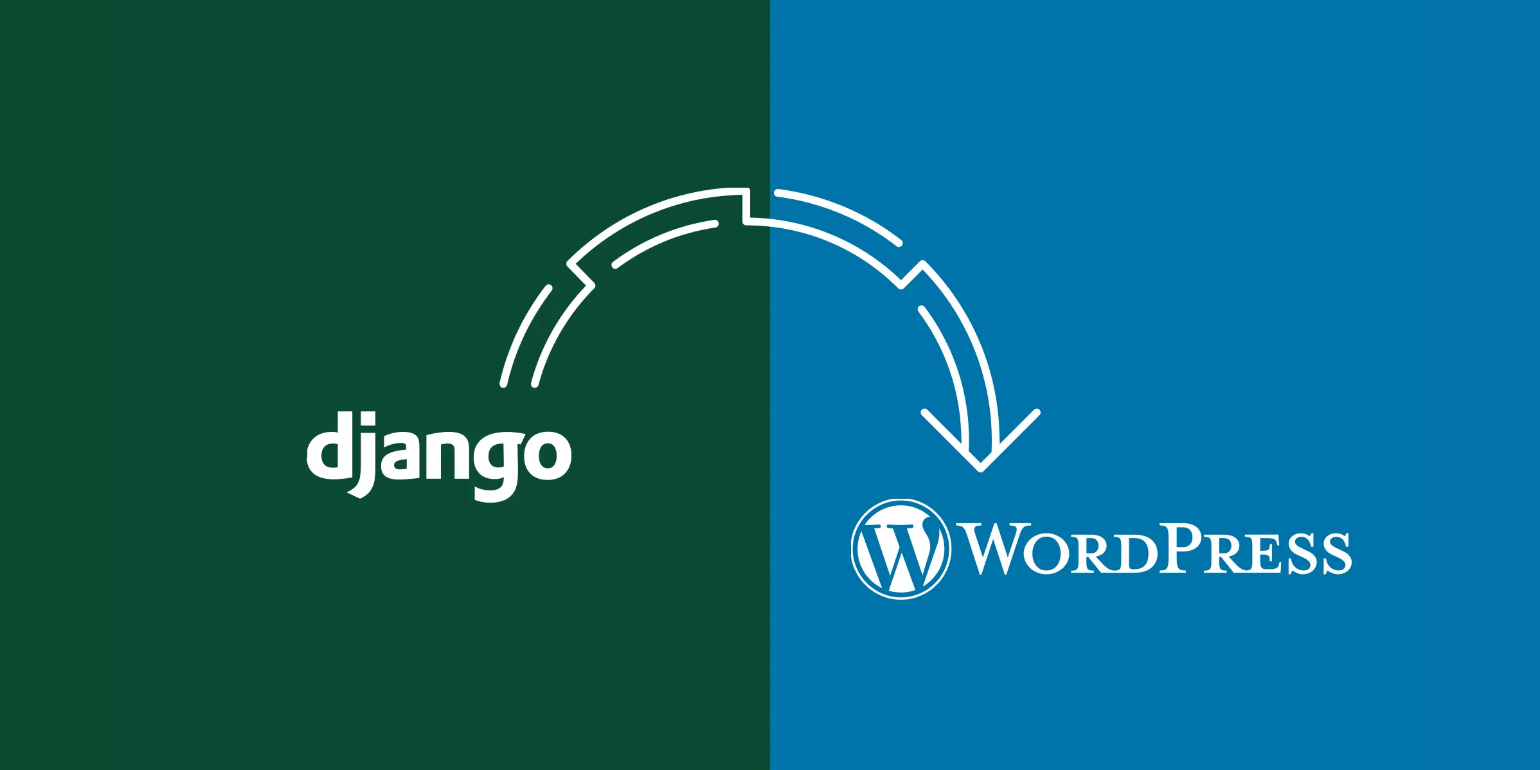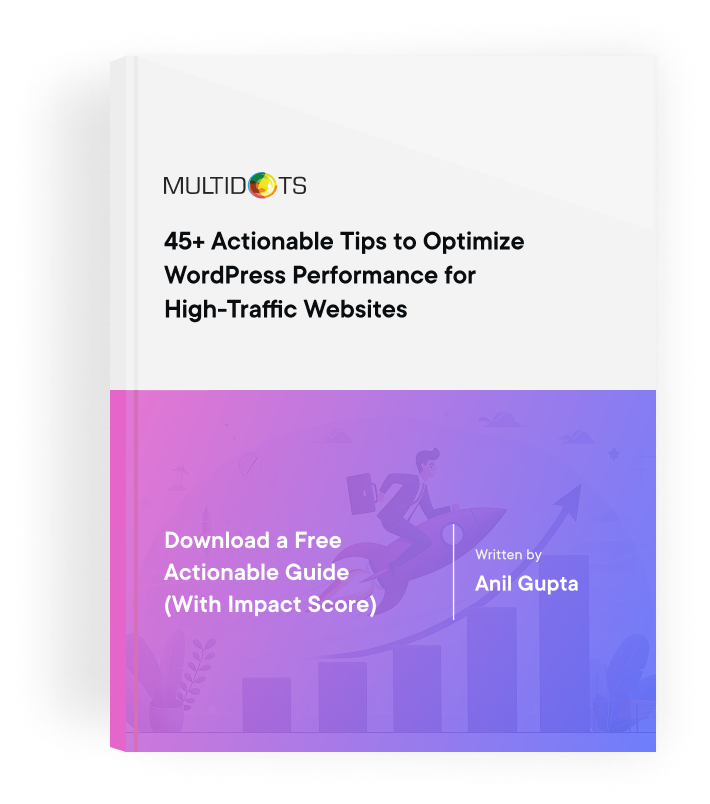5 Things to keep in Mind Before Migrating Django to WordPress
Keep these 5 essential factors in mind before migrating from Django to WordPress for a seamless transition

Table of Contents
Moving a website to a new CMS is like moving house. There are so many different things you must keep in mind and forgetting any one of them can result in your encountering certain challenges either during migration or post migration, when you find some data missing or features not as per expectations. Content management systems (CMS) like Django and WordPress are popular choices for managing websites, but they differ significantly in terms of functionality, customization, and user experience.
WordPress is extremely easy to use and offers a high degree of customization, making it attractive for users migrating from Django who want tailored features and improved functionality.
Django to WordPress migration isn’t an easy task and therefore you must get expert help that is someone who is well-versed with all the challenges associated with this specific migration process. One of the biggest challenges is the fact that Django is a Python-based framework, while WordPress is a PHP based framework. WordPress is the most popular CMS and holds a significant market share among content management systems, making it a preferred choice for many website owners.
Both Django and WordPress are open source CMS options, but WordPress is often seen as the clear winner due to its usability, community support, and scalability.
Let’s take a look at the various aspects of a seamless switch to WordPress from Django:
1. Pre-migration Focus
Approach Django to WordPress migration in an extremely strategic manner. Through careful planning, you will get to zero in on the potential migration risks you will encounter and can take preemptive steps to avoid these risks. Having sufficient technical knowledge is crucial for accurately assessing migration requirements and potential challenges.
One such risk is not migrating all critical data to the new site. This is why you need to conduct pre-migration data assessment. It is essential to thoroughly analyze your website's data to ensure nothing is missed during migration. This will ensure you are able to identify all critical and non-critical data that must be migrated from Django to WordPress. A thorough website audit needs to be implemented that will help you document the database and data structure on the site.
This will also help you figure out the scope and scale of migration and identify ideal timeframes. Thus, you can schedule your migration in a seamless manner, knowing what needs to be done and when it needs to be done; you have in-depth data awareness for an effective and successful migration.
Pro Tip: Migrate during lean season: Migrating at a busy time for the website is a really bad idea. A well-planned migration doesn’t cause a traffic dip, but why take a chance. Migrating during the less busy times, means you don’t miss out on any important traffic. E.g., if you are an ecommerce site, migrating your site during the holiday season doesn’t make sense.
2. Take Data Backup
Even the best laid plans might come undone, in a carefully planned migration process. You don’t want to end up in situation wherein, you lose data during migration (a very plausible scenario), and you have no way of getting this data back.
This is where data backup enters the picture.
All those files that you have identified through the data assessment and audit process now must backed up. This way you will have immediate access to these files if and when you do need them. To get the data back up process right make sure that you evaluate file size and check whether you can directly export files or choose the command line to take backup of your files. This is a critical step as data is the primary currency of your old website. If for some reason, you lose data, you can’t recreate it, you will need back up. Before starting the backup, ensure your new domain is properly prepared and all necessary credentials, including ftp credentials, are ready for the migration.
Things to do before you take data backup:
- inaccurate
- future
- from your database
- Securely manage and store your ftp credentials to ensure a smooth migration and backup process
Checkout some of cloud-backup services you can use to backup your data here.
3. Data Security
(Note: You have taken data backup, but the services provider will also have access to your data, and you must be assured that it is being protected at all times)
Taking a backup of your data is all well and good, but what about data security? Make sure that there are strict security protocols in place wherever you are storing your data – there is a case wherein you are working with an external service provider for Django to WordPress migration and the data will be stored on their server. In such cases, don’t take security for granted. The level of data protection is directly proportional to the strength of the security measures implemented. Django is an open source framework, and like other open source frameworks, it requires careful security management during migration.
According to IBM, the global average cost of a data breach is $3.86 million. Don’t add your money into the mix.
Also, security protocols assume importance if you are working with customers who are EU citizens. All their data is protected under GDPR (General Data Protection Regulation). If their data falls into the wrong hands, you will be penalized. This makes it all the more important for you to ensure the data migration company you are working with, has strict security protocols in place.
Take a closer look at their cybersecurity posture and check what protocols are in place to secure data. Do they use server protection and adhere to data security regulations? This is the critical aspect you must look at.
4. Partner with a WordPress Migration Expert
This is again a serious aspect of your migration process. Who will oversee your migration effort? Who do you trust to ensure that your objective to migrate Django-CMS to WordPress happens successfully?
Ideally, you need to work with a WordPress development company with in-depth expertise in WordPress migration, but more importantly this company should have a successful track record of migrating Django to WordPress. It is highly recommended to work with experienced WordPress developers who specialize in handling complex migration and customization tasks.
Additionally, technical expertise in both Django and WordPress is essential to address the unique challenges that may arise during the migration process. As we had told you earlier, there are certain aspects, that are very specific to Django and which might cause problems during migration. This is why an understanding of Django is also crucial for a smoother migration effort.
5. Site SEO and Downtime
Something, you must have really put a whole lot of time an effort into, is your website SEO.
Your website is showing strong SEO performance, and many a times, despite many of the functional problems you are facing on Django, you don’t want to migrate to WordPress. You are scared that you will have to rebuild all that carefully won SEO value. But don’t worry - in the hands of expert SEOs your website’s SEO performance will remain the same on WordPress websites as well. The WordPress CMS is known for its robust SEO capabilities, offering a wide range of plugins and built-in features that make it easier to optimize your site compared to Django.
But you need to undertake some preparations yourself.
SEO is the lifeblood of your website and when you migrate, you need to spend some time in detailing your technical SEO specifications. Remember, the developers who are in charge of the migration process, must be able to understand your requirements and take action on them. These specifications are not about ‘Why’ this implementation is necessary but ‘How’ the implementation must happen. When preparing for migration, keep in mind that WordPress makes it much easier to manage content through its user-friendly interface, themes, and plugins, unlike Django which often requires more technical expertise.
Some of key requirements you must not forget to cover include:
- URL structure
- Meta data (including dynamically generated default values)
- Structured data
- Canonicals and meta robots directives
- Copy & headings
- Main & secondary navigation
- Navigation structure
- Internal linking (in any form)
- Pagination
- XML sitemap(s)
- HTML sitemap
- Hreflang (if there are international sites)
- Mobile setup (including the app, AMP, or PWA site)
- Redirects
- Custom 404 page
- JavaScript, CSS, and image files
- Page loading times (for desktop & mobile)
You will get the benefit of identical URLs and all on-site optimization that is a replication of your Django website SEO. This means your new website’s rankings are not impacted in any way or form.
Migrating to WordPress also means you can take advantage of the wide range of features and benefits that WordPress offers, such as extensive theme and plugin options, SEO tools, and strong community support, making it a superior choice for many site owners.
Another critical aspect is website downtime. In today’s world, you cannot afford any website downtime; in the even there is a downtime, you are disconnected from your customers. Businesses worry that, the migration process will result in certain downtime that will impact their business. So, make sure that you check with your developers whether the transition from WordPress to Django will result in downtime. Expert developers will ensure your Django website is active, till the WordPress site goes live.
Technical Requirements for Migration
Migrating a Django website to a WordPress site involves more than just moving content—it requires a thorough understanding of both platforms’ technical landscapes. Before starting the migration process, site owners should carefully assess the Django website’s data structure, including all content types, user accounts, and any custom code or unique functionalities built with the Django CMS. Mapping these elements to their WordPress equivalents is essential to ensure nothing is lost in translation.
It’s also important to identify which essential plugins and themes will be needed for the new WordPress installation to replicate the original site’s features and user experience. Consider the specific functionalities your Django site offers—such as custom forms, user management, or complex data structures—and research how these can be implemented using WordPress plugins or custom development.
Performance, security, and scalability should be top priorities when planning your new WordPress website. Evaluate how your current Django site handles traffic and data, and ensure your new WordPress site is set up to meet or exceed these standards. By addressing these technical requirements early, you’ll lay the groundwork for a smooth transition and a successful migration, minimizing the risk of unexpected issues and ensuring your new WordPress site is robust, secure, and ready for growth.
The Migration Process
The migration process from a Django website to a WordPress site is a multi-step journey that requires careful execution to ensure all the data and functionality are preserved. The first step is to export your Django site’s data—including content, images, and user accounts—using either the UpdraftPlus WordPress backup plugin, custom scripts, or other data export tools. This ensures you have all the necessary information ready for transfer.
Once the data is exported, it often needs to be cleaned and formatted to match WordPress’s structure. This may involve converting database fields, adjusting image formats, or restructuring user data. After preparing your data, you can import it into your new WordPress site using plugins like WP All Import or by writing custom code tailored to your website’s needs.
With the data in place, the next phase is setting up your WordPress site. This includes installing and configuring essential plugins, selecting and customizing a WordPress theme to match your brand, and fine-tuning site settings for optimal performance and security. Throughout the migration process, it’s important to test each step to catch any issues early. By following a structured approach, you can ensure your Django to WordPress migration is efficient, secure, and results in a fully functional new WordPress site.
Testing and Debugging
After migrating your Django website to a WordPress site, thorough testing and debugging are essential to guarantee a smooth transition. Begin by reviewing all content, user accounts, and site functionalities to ensure everything has transferred correctly. Check for broken links, missing images, and formatting inconsistencies that may have occurred during the migration process.
It’s also important to test all installed plugins and your chosen WordPress theme to confirm they work seamlessly with your new site setup. Tools like Yoast SEO can help you identify and resolve technical SEO issues, while also providing insights into website performance. Don’t overlook security—run tests to ensure your new WordPress site is protected against vulnerabilities and that user data is secure.
To safeguard against data loss, always keep a recent backup using plugins like UpdraftPlus. This allows you to quickly restore your site if any issues arise during testing or debugging. By dedicating time to comprehensive testing and debugging, you’ll ensure your new WordPress site is reliable, user-friendly, and ready for launch.
Post-Migration Considerations
Once your Django to WordPress migration is complete, it’s crucial to address several post-migration considerations to maintain website continuity and performance. Start by ensuring your new WordPress site remains accessible to users throughout the transition. This can be achieved by setting up temporary redirects, updating DNS records, and configuring caching plugins to minimize downtime and provide a seamless user experience.
Maintaining your search engine rankings is another top priority. Update all metadata, optimize your content, and configure SEO plugins like Yoast SEO to help search engines properly index your new site. Regularly monitor your site’s SEO performance and make adjustments as needed to preserve your visibility in search results.
Additionally, review your hosting setup and website performance. Choose a reliable hosting provider, optimize server settings, and use performance-enhancing plugins to keep your site running smoothly. By proactively managing these post-migration tasks, you’ll ensure your new WordPress site continues to attract visitors, ranks well in search engines, and delivers a high-quality experience for your users.
Hosting and Performance
Selecting the right hosting options and optimizing website performance are critical steps for any successful WordPress site. The hosting provider you choose directly impacts your site’s loading times, security, and overall reliability. Consider options such as shared hosting, VPS, or managed WordPress hosting, depending on your site’s size and traffic needs.
Once your hosting is in place, focus on optimizing your new WordPress site for speed and security. Use plugins like W3 Total Cache or WP Super Cache to improve loading times, and implement security plugins such as Wordfence Security to protect your site from threats. Don’t forget to set up regular backups—using tools like UpdraftPlus—to safeguard your website’s data against unexpected issues.
Additional performance enhancements, such as integrating a content delivery network (CDN) and enabling SSL certificates, can further boost your site’s speed and security. By prioritizing hosting and performance, you’ll provide a better user experience, improve your search engine rankings, and set your WordPress site up for long-term success.
Conclusion
These are just 5 of the many things that you must keep in mind before moving your site to WordPress from Django. Bear in mind that in the hands of experts, this process will be handled smoothly, without your business continuity getting impacted in any way or form. So, only work with Django to WordPress conversion experts.
Feel free to schedule a quick call with our migration expert.
Contact Us
